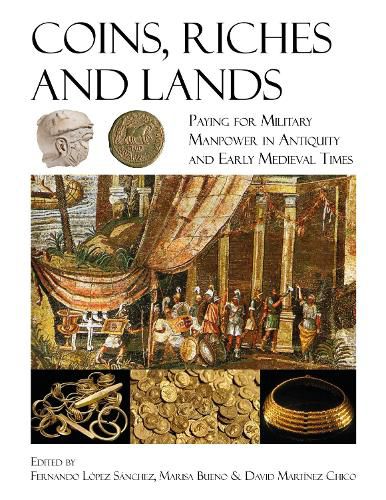Readings Newsletter
Become a Readings Member to make your shopping experience even easier.
Sign in or sign up for free!
You’re not far away from qualifying for FREE standard shipping within Australia
You’ve qualified for FREE standard shipping within Australia
The cart is loading…






Land was the ideal store of wealth in the ancient Mediterranean world. It brought social respectability, and its possession allowed participation in the politics of the cities governed by landowning elites. Crucial defense of the interests of a given polity through armed services often involved the distribution of lands to laborers still not integrated in these societies. Mediterranean urban dynamics also involved paid labor and were always in need of short-contract manpower, including skilled soldiers and warriors. For short-time military services, lands were not always available so soldiers and warriors were paid with coins and riches. Because of their superior development, urban economies in the Mediterranean were able to attract migrant paid labor. When returning home, the migrant warriors carried coins and riches that would enable them to maximize the return that a homecoming entailed. Although difficult to prove whether these men were paid in advance or when discharged, it is an important issue as it shows the strength of one contractor over another and helps to better understand the construction of statehood in ancient and early medieval times. This collection of papers sheds light on how coins, riches, and lands were gained and distributed among soldiers, warriors, and mercenaries. Contributions cover a wide chronological span from Late Pharaonic to early medieval times, linking a well-defined core area, the Mediterranean basin, with its peripheries: Central Europe and Scandinavia to the north and the margins of the Sahara Desert and the Fertile Crescent to the south and the east. AUTHORS: Fernando Lopez Sanchez is currently Lecturer at the Complutense University of Madrid. He is both an ancient historian and a numismatist interested in Greek, Roman and early medieval coinage. He has worked in several European universities and in different Numismatic Cabinets, among them in the British Museum and in the National Library of France. Marisa Bueno is Research Fellow at the Complutense University of Madrid. Her main research has focused on the study of cultural change derived from the processes of conquest, the Islamisation and its impact in the rural and urban spheres. David Martinez Chico is Margarita Salas Fellowship at the University of Valencia, where he completed a PhD in Archaeology. His scientific production is interdisciplinary in nature and includes international publications in numismatics, epigraphy, archaeology and archaeometry with the aim of studying the economy of the Roman world. 120 b/w illustrations
$9.00 standard shipping within Australia
FREE standard shipping within Australia for orders over $100.00
Express & International shipping calculated at checkout
Land was the ideal store of wealth in the ancient Mediterranean world. It brought social respectability, and its possession allowed participation in the politics of the cities governed by landowning elites. Crucial defense of the interests of a given polity through armed services often involved the distribution of lands to laborers still not integrated in these societies. Mediterranean urban dynamics also involved paid labor and were always in need of short-contract manpower, including skilled soldiers and warriors. For short-time military services, lands were not always available so soldiers and warriors were paid with coins and riches. Because of their superior development, urban economies in the Mediterranean were able to attract migrant paid labor. When returning home, the migrant warriors carried coins and riches that would enable them to maximize the return that a homecoming entailed. Although difficult to prove whether these men were paid in advance or when discharged, it is an important issue as it shows the strength of one contractor over another and helps to better understand the construction of statehood in ancient and early medieval times. This collection of papers sheds light on how coins, riches, and lands were gained and distributed among soldiers, warriors, and mercenaries. Contributions cover a wide chronological span from Late Pharaonic to early medieval times, linking a well-defined core area, the Mediterranean basin, with its peripheries: Central Europe and Scandinavia to the north and the margins of the Sahara Desert and the Fertile Crescent to the south and the east. AUTHORS: Fernando Lopez Sanchez is currently Lecturer at the Complutense University of Madrid. He is both an ancient historian and a numismatist interested in Greek, Roman and early medieval coinage. He has worked in several European universities and in different Numismatic Cabinets, among them in the British Museum and in the National Library of France. Marisa Bueno is Research Fellow at the Complutense University of Madrid. Her main research has focused on the study of cultural change derived from the processes of conquest, the Islamisation and its impact in the rural and urban spheres. David Martinez Chico is Margarita Salas Fellowship at the University of Valencia, where he completed a PhD in Archaeology. His scientific production is interdisciplinary in nature and includes international publications in numismatics, epigraphy, archaeology and archaeometry with the aim of studying the economy of the Roman world. 120 b/w illustrations